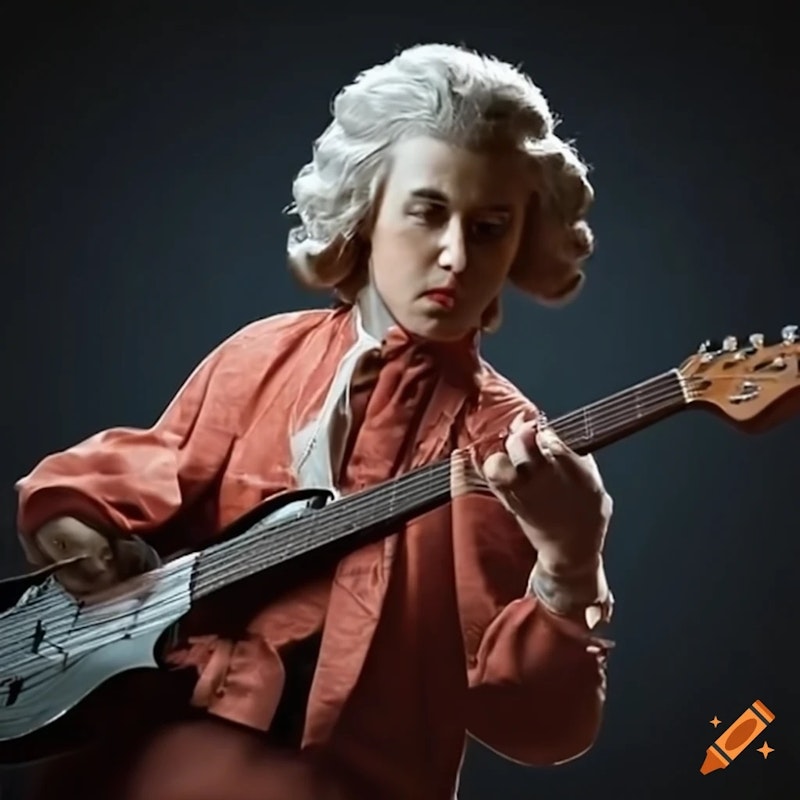Over time I’ve found myself in situations where someone has speculated about what the great composers of history would be doing if they were currently alive. One idea I’ve heard is that Mozart would be a progressive rock musician, writing something along the lines of Math Rock or maybe Emerson, Laker and Palmer. The same person suggested that Beethoven would be a power guitarist, with long hair, covered in tattoos. Someone else said that if Wagner was alive today he’d be into Dark Metal or Kraut Rock, like Rammstein magnified to the nth power.
Nothing exists in a vacuum. Classical music originated organically out of village dances and folk songs over hundreds of years. Bartok, the Hungarian composer, went around with a disc recorder in the 1920s and tried to record as many of them that still existed before they completely disappeared. He discovered connections between the folk songs from his native Hungary and Turkey suggesting a vast, mostly unknown network of exchange and influence.
Mozart, known for synthesizing the Italian lyric and German harmonic musical traditions, was educated by his ambitious composer father, and when his son’s gifts were recognized, he capitalized off them as long as he could, putting him on display in the courts of Europe. Beethoven’s father, seeing Mozart’s success, pushed little Ludwig in the same direction, even lying about his age, hoping to have another child prodigy and the money and social connections it offered. Wagner hoped to infuse opera, in its new 19th-century form, as a mass-market popular genre, with the expressive power of Beethoven. These three men were operating in a cultural milieu that supported and gave direction to their creative activity.
Could the same conditions that produced Mozart, Beethoven and Wagner come back one day? Pierre Boulez, the avant-garde French composer, more-or-less single-handedly created institutions that he hoped might create the proper setting for the development of a new tradition, one based upon the post-WWII avant-garde schools of music. First, there’s IRCAM, a computer-assisted electronic research music center; next, he convinced the French government to build the City of Music, a large complex combining the National Conservatory, a series of concert halls, archives and a museum. Maybe one day Mozart Jr. will emerge from one of these institutions; maybe he already has. Would, or did, anybody notice?
Perhaps Mozart would’ve moved to Hollywood. When I hear film music I usually feel like I’m in a game of “guess which famous composer is being poorly imitated.” Still, film music is popular, there’s a market to be exploited, so why not? It’s fair to ask, why aren’t composers outside of film composing music that mass audiences want to hear? One sees concerts by John Williams, Ennio Morricone, Howard Shore and others, you’d think some “serious” composer would try it. But, to my knowledge, not one has, at least successfully. Maybe they’re afraid of being called sell-outs. But even though it can pay extremely well, it’s difficult to imagine Mozart, Beethoven or Wagner composing film music, since it wasn’t their natural environment.
The historical evolution in musical language is also directly linked to technical developments in instrument technology. Sometimes the changes were gradual like the evolution of the shawm, crumhorn, chalumeau and sackbut into the oboe, bassoon, clarinet, and trombone. Other changes came fully-formed like the modern string family, created in one fell swoop by Andrea Amati around 1564. Wagner worked directly with manufacturers to build instruments especially for his works. This too has changed. Though there are plenty of new instruments, none are fully accepted into the orchestra.
Every modern composer feels that they’re already doing what the great composers would be doing if alive today. If they didn’t, what would be the point in the undertaking? I wonder if the thread connecting the present to past traditions hasn’t been irrevocably broken. An artificial and man-made world is, ever more rapidly, replacing our connection with the earth, the past and ourselves. Unless a number of elements come together at once—technical, social and musically linguistic—to create an authentic cultural setting which can nurture genius, people will speculate about Mozart for a long time to come.

